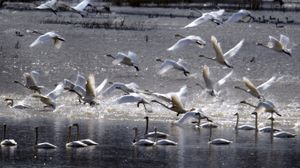Waterfowl love the wetness soaking the region
SPRING MIGRANTS -- The region's wet spell is putting a damper on a lot of activities, but waterfowl are in their element as they pause during their spring migrations in the Inland Northwest's wealth of flooded fields and wetlands.
Ducks, geese and swans have so many options, they're fooling even experienced birders in their back yards.
John Stuart of Newport, fresh in from a birding trip in his neck of the woods, was disappointed over the weekend to see the 1,500 tundra swans had left Calispell Lake in Pend Oreille County.
"The migrating Tundra swans, usually a big noisy deal on Calispell Lake, sort of pulled a switcheroo on us, thanks to the weather," he said in a report to Inland Northwest Birders. He assumed that because the lake had risen 3 feet in a couple days -- and swans necks being only so long, they could no longer reach the submerged comestibles and had to take their leave."
But soon after he put out the report, he heard from other birders and set the record straight Wednesday afternoon:
Apparently my story of the Swans at Calispell Lk. was not as black and white as I supposed. Terry Little found a big crowd there on Friday (30th) and Jon Isacoff found a couple thousand on Tues (3rd), while we saw none on Sunday. But Jon found a guy at Riverbend (about 10 miles north) who said the swans had been up there feeding on the larger than usual flooded field. So apparently the birds were finding some alternative feeding areas without leaving the area.
So the rain eliminated one area for feeding but created at least one new one.

